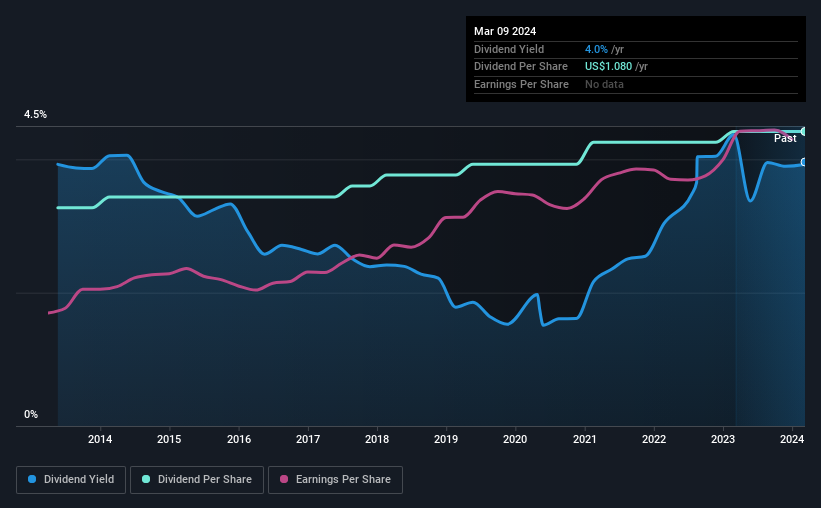Be Sure To Check Out First Capital, Inc. (NASDAQ:FCAP) Before It Goes Ex-Dividend
First Capital, Inc. (NASDAQ:FCAP) stock is about to trade ex-dividend in four days. The ex-dividend date is usually set to be one business day before the record date which is the cut-off date on which you must be present on the company's books as a shareholder in order to receive the dividend. The ex-dividend date is an important date to be aware of as any purchase of the stock made on or after this date might mean a late settlement that doesn't show on the record date. Therefore, if you purchase First Capital's shares on or after the 14th of March, you won't be eligible to receive the dividend, when it is paid on the 29th of March.
The company's next dividend payment will be US$0.27 per share. Last year, in total, the company distributed US$1.08 to shareholders. Calculating the last year's worth of payments shows that First Capital has a trailing yield of 4.0% on the current share price of US$27.27. If you buy this business for its dividend, you should have an idea of whether First Capital's dividend is reliable and sustainable. As a result, readers should always check whether First Capital has been able to grow its dividends, or if the dividend might be cut.
View our latest analysis for First Capital
If a company pays out more in dividends than it earned, then the dividend might become unsustainable - hardly an ideal situation. Fortunately First Capital's payout ratio is modest, at just 28% of profit.
Companies that pay out less in dividends than they earn in profits generally have more sustainable dividends. The lower the payout ratio, the more wiggle room the business has before it could be forced to cut the dividend.
Click here to see how much of its profit First Capital paid out over the last 12 months.
Have Earnings And Dividends Been Growing?
Companies with consistently growing earnings per share generally make the best dividend stocks, as they usually find it easier to grow dividends per share. If earnings fall far enough, the company could be forced to cut its dividend. With that in mind, we're encouraged by the steady growth at First Capital, with earnings per share up 6.5% on average over the last five years.
Many investors will assess a company's dividend performance by evaluating how much the dividend payments have changed over time. In the past 10 years, First Capital has increased its dividend at approximately 3.0% a year on average. It's encouraging to see the company lifting dividends while earnings are growing, suggesting at least some corporate interest in rewarding shareholders.
To Sum It Up
Is First Capital worth buying for its dividend? It has been growing its earnings per share somewhat in recent years, although it reinvests more than half its earnings in the business, which could suggest there are some growth projects that have not yet reached fruition. We think this is a pretty attractive combination, and would be interested in investigating First Capital more closely.
While it's tempting to invest in First Capital for the dividends alone, you should always be mindful of the risks involved. To help with this, we've discovered 1 warning sign for First Capital that you should be aware of before investing in their shares.
If you're in the market for strong dividend payers, we recommend checking our selection of top dividend stocks.
Have feedback on this article? Concerned about the content? Get in touch with us directly. Alternatively, email editorial-team (at) simplywallst.com.
This article by Simply Wall St is general in nature. We provide commentary based on historical data and analyst forecasts only using an unbiased methodology and our articles are not intended to be financial advice. It does not constitute a recommendation to buy or sell any stock, and does not take account of your objectives, or your financial situation. We aim to bring you long-term focused analysis driven by fundamental data. Note that our analysis may not factor in the latest price-sensitive company announcements or qualitative material. Simply Wall St has no position in any stocks mentioned.

